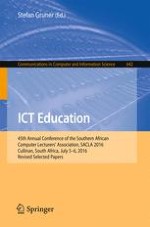2016 | OriginalPaper | Buchkapitel
A Case Study in the Use of the Five Step Peer Evaluation Strategy to Improve a First Year Computer Literacy Course: An Exercise in Reflective Evaluation Practice
verfasst von : Mosiuoa Tsietsi
Erschienen in: ICT Education
Aktivieren Sie unsere intelligente Suche, um passende Fachinhalte oder Patente zu finden.
Wählen Sie Textabschnitte aus um mit Künstlicher Intelligenz passenden Patente zu finden. powered by
Markieren Sie Textabschnitte, um KI-gestützt weitere passende Inhalte zu finden. powered by
